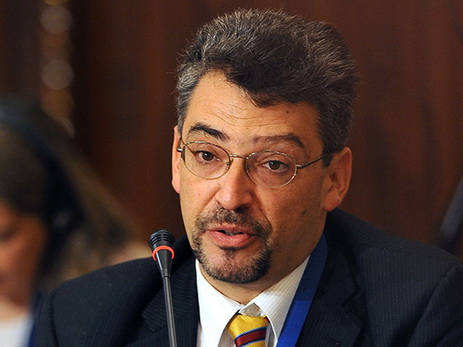Ariel Cohen: US Leadership Amiss in Resolving the Armenia-Azerbaijan Clash over Nagorno-Karabakh

The fighting in Nagorno-Karabakh is like a chronic affliction that simmers down but never really stops.
Escalations in the level of hostilities regularly arrive with melt-offs of the mountain snow. However, the eruption that began on April 2nd has flared up to levels unseen since the 1990s.
A fragile cease-fire is holding, but this unstable equilibrium can blow up with consequences for the South Caucasus and beyond. Turkish-Russian tensions are at their highest since the end of the Cold War. With Washington AWOL and the U.S. busy with its most polarizing electoral campaign since 1964, Russia is likely to take this opportunity to consolidate its sphere of influence and boost its power in its southern flank.
While biological metaphors in social sciences are abhorrent, chronic conflicts do have a disease-like, incurable quality. Just think of the Arab-Israeli or Northern Ireland situations. Nagorno-Karabakh has long been an area of such chronic ethno-religious clashes. The territory was populated by Christian Armenians and Shia Turks (Azeris); the Persian and the Russian Empires ruled it for centuries.
After the fall of the Romanovs in 1917, the Bolsheviks under Joseph Stalin’s leadership, made this mostly ethnically Armenian area an Autonomous Region of Soviet Azerbaijan. Some Armenian lands were also divided between communist Russia and Mustafa Kemal Ataturk’s ascendant Turkish Republic under the Treaty of Kars (1921). Today, many in Armenia question the validity of that treaty, as both contracting parties were not yet established at the time of the signature, but it had been observed for over 90 years. Any unilateral revisions are likely to lead to a war.
Tensions between the Armenians and Azerbaijanis were largely contained under the Soviet empire, but exploded in 1988. When the Soviet Union collapsed in 1991, Karabakh declared “independence”, the fighting escalated, and 600,000 Azeris were ethnically cleansed from Karabakh and seven districts of Azerbaijan; while 300,000 Armenians from Azerbaijan fled to Armenia. A cease-fire was brokered by Russia in 1994. Since then, the conflict persists, and Armenia is still occupying seven Azeri districts. Armenian territorial ambition is clearly a conflict driver.
Unfortunately, the U.S. and the West have neglected the regional dimensions of the conflict, despite the fact that it has implications for clashes of interest involving Russia, Turkey, Iran, the EU and the U.S.
Russia is using peaceful rhetoric while selling arms to both sides. It has also destabilized two South Caucasus republics: Georgia and Azerbaijan - and built up power in the region.
Massive Russian power is projected through bases in Abkhazia, South Ossetia and Armenia: the air force, and air-defense control the joint Russian-Armenian air envelope over the South Caucasus.
The Russian military presence has been building up in Armenia for decades. The recent clashes in Nagorno-Karabakh will give Moscow excuses to deploy Russian peace-keepers, making this “frozen” conflict into a Russian dessert.
Russia is also weaponizing regional transportation corridors, connecting its railways to those of Georgia, Azerbaijan, and Iran, thus creating a South-North axis. Another railroad goes from Russia through Abkhazia via Georgia to Armenia - and on to Iran.
The military build-up in the region will also allow Russia to disrupt the East-West Corridor between Europe and Central Asia via Azerbaijan and Georgia, including the Southern Energy corridor, which harbors two main export pipelines for oil and gas.
The Karabakh conflict threatens 1 million barrels a day of Azeri oil that is delivered through the Baku-Tbilisi-Ceyhan pipeline, and 16 billion cubic meters of gas now supplied to Georgia and Turkey - and when the TANAP/TAP pipelines are completed - to Europe as well.
It is unfortunate that the EU and the U.S. have persistently refused to have a look at the maps and move to protect Western interests with more than words. For example, there were only six Western OSCE observers along the Line of Contact between Karabakh, Armenia and Azerbaijan, which is risible. Both the US and the EU/France, as co-chairs of the Minsk Group have been completely inefficient in resolving the conflict and preventing new clashes.
U.S. involvement in the region is lukewarm - to our own peril. President Obama refused to meet with President Ilham Aliyev during the Nuclear Summit held in Washington just days before the clash. Nor did he host a triangular meeting with Aliyev and Armenian President Serge Sargsyan. Joe Biden’s separate meetings with the two failed to stave off the mayhem.
At the rate the current presidential campaign is going, there are some candidates in both parties who cannot spell Azerbaijan, let alone Karabakh. Pointing to it on the map is definitely out of question. With such Commanders-in-Chief in waiting, the American ability to furnish leadership is at grave risk.
Even after the hostilities erupted earlier this month, evidence of Obama’s leadership remained amiss. This has left Russia to play the diplomat. This helps Russia to break out of its international isolation, and divert the world’s attention from Moscow’s share of the Panama Papers revelations. The latest cease-fire was negotiated by Russia directly, bypassing the Minsk group.
In fact, the US and the EU are allowing Russia to rebuild its imperial, neo-Soviet sphere of influence. In the long term, this is definitely not in the interests of United States — or of its European allies and Turkey. Nor will the post-Soviet states benefit from it, not even Armenia, which is increasingly becoming Russia’s fiefdom.
This trend is reviving an expensive geopolitical competition worldwide, undermining pro-Western forces, and can eventually threaten NATO’s southern flank as well as important energy interests.
The Great Game is back. In fact, it never really went away.
Dr. Ariel Cohen
Nonresident Senior Fellow, Atlantic Council














